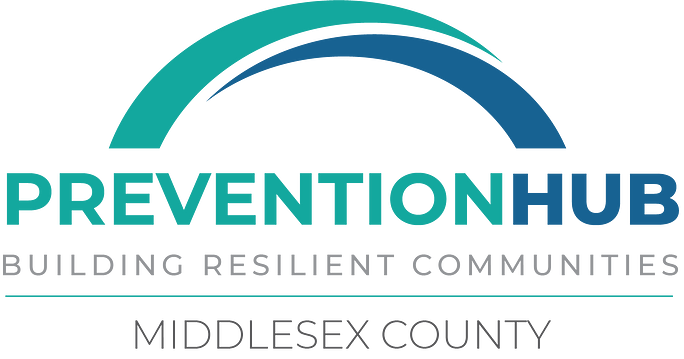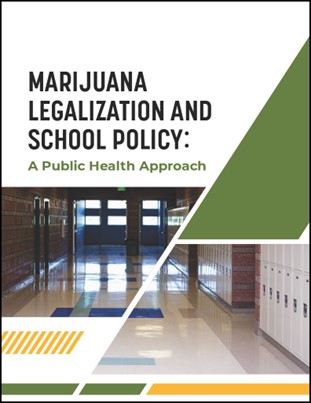For youth and families to thrive in a safe and healthy environment, communities must address the numerous risk factors that lead to the early use of alcohol and other drugs, often the first step on a path to addiction.
The statewide system of Prevention Hubs provides evidence-based prevention education, interventions, strategies, and programs to support all sectors of our community, including youth, parents, schools, law enforcement, faith-based organizations, etc.
The Prevention Hub of Middlesex County is hosted by Wellspring Center for Prevention and connects residents and professionals with prevention resources and services, building resilience in our local communities.

The Middlesex County Prevention Warm Line is a clear connection point to access both evidence-based prevention programs for youth and families, as well as information and referral for those in need of assistance with navigating local and state family support services being offered by the Prevention Hub and beyond.
Trained staff are available on weekdays from 9:00 a.m. to 4:00 p.m. to connect callers to local and state-level resources and other supportive services.
About the Prevention Hub at Wellspring Center for Prevention
In late 2021, Wellspring was designated as the Middlesex-County-Specific Prevention Hub thanks to a grant from the Substance Abuse and Mental Health Administration (SAMHSA) and the New Jersey Division of Mental Health and Addiction Services (DMHAS).
Wellspring is collaborating with the New Jersey Prevention Network (NJPN) to establish a statewide Infrastructure of Prevention Hubs in every county providing access to evidence-based prevention information and resources for all sectors of the community including youth, parents, schools, law enforcement, faith-based organizations, and more.
Wellspring will provide a clear access point for services with staff coverage for calls and emails. We are committed to ensuring the community is aware of services and has easy access through its website, email, and phone number. Wellspring staff, which includes experts, provide face-to-face technical assistance and trainings as needed and appropriate.
- Agency will provide outreach to the community to provide prevention resources and technical assistance for community-based organizations on evidence based prevention including the Strategic Prevention Framework (SPF) process.
- Agency will utilize the SPF process internally as well as promoting its use by community organizations looking to implement evidence based prevention.
- Agency will provide specific outreach to disparate communities and populations to provide support to improve access to EB prevention.
- Agency will work to establish or enhance materials and resources that are appropriate such as translated materials.
- Agency will provide general community awareness education on ATOD or related issues as requested and appropriate
- The agency will work with NJPN on the implementation of a Middlesex County Warmline.
- The Hub will include Information and Referral Services (I&R Services) and provide a local connection to assist residents navigate the local and state resources available to support them and their families.
- The Prevention Hub system will be a respected local resource that is welcoming to people in need of addiction services and will be a connector to state-level resources such as Reach NJ, 211 and other supportive services.
- Agency will train staff on importance of screening and on various tools available to work with the community, especially for youth.
- Provide training and promotional activities regarding the importance of screening youth in areas such as early first use, ACEs, mental health issues, etc. Training adults from all sectors of the community to enable them to better be able to identify youth that need support.
- Agency will raise awareness of community need on the use of various assessment/screening tools, as well as mental health First Aid (MHFA) to be included within systems that support youth including schools, pediatricians, youth serving organizations, etc.
- Wellspring might also offer training in specific tools and/or possible system changes such as resiliency team training for schools and/or communities and other trainings that will promote creating a supportive response instead of a punitive approach when youth demonstrate behavioral issues
- Wellspring will promote establishment of screening systems and build system capacity not actually provide screenings through this funding. Training adults from all sectors of the community to be more aware of ACEs, SDOH, and the effects of trauma makes them better able to identify youth that need support. This, in effect, makes adults able to screen for warning signs for substance misuse and mental health issues in kids.
Agency may choose to also consider these Options for where screening and referral services are needed within School/community:
- Early intervention for kids at risk referred by SACs/Schools
- Handle-with-care referrals
- High Risk Youth in an Early Intervention Programs being screened for further services for them and their family
- Possibly add screening questions to Strengthening Families Program participant such as conduct phone pre-screening to determine need for other interventions
- Implement the Preventure Screening/Survey (Substance Use Risk Profile Scale) as the first step of implementing the Preventure program.
- Agency staff will be trained the delivery of PreVenture, an evidence-based prevention program that uses personality targeted interventions to promote mental health and skill development and delay youth substance use. PreVenture is designed to help at-risk youth ages 12-17 learn useful coping skills, set long term goals, and channel their personality towards achieving them.
- Wellspring will utilize a newly created curriculum and other possible health messaging materials for Community, Parent and Youth to Youth Education.
- Agency will also provide community training through various events on topics including topics such as the new Marijuana Law and how it will impact youth, Perception of harm, brain development, and the increased availability of marijuana products.
- Wellspring is expected to provide education on best practices in public health policies that will help guide communities, schools and others related to marijuana policies.
- And, the agency may choose to also consider the implementation of Other EBP programs that address marijuana prevention; Law Enforcement Training; and Peer Leadership Programming and Support
- Utilize specialized materials and curriculum, Wellspring will promote programs to schools as a resource for health classes
- Enhance current programs with new information on OTC as appropriate
- Provide educational presentations for youth, parents, older adults and community
- Possibly train youth leaders to provide youth-to-youth trainings, and older adult education as appropriate
Marijuana School Tool Kit
We are excited to announce the release of Marijuana Legalization and School Policy: A Public Health Approach. This comprehensive toolkit was created by NJPN in consultation with LEGAL ONE as a guide for school administrators to understand which school policies stay the same and which must be updated or changed, in light of new state laws related to cannabis.
As schools update their policies, it is important to consider them through a public health lens and to move away from ineffective punitive responses to student substance use, opting instead for a more supportive approach.

Marijuana Legalization and School Policy: A Public Health Approach includes guidance from NJ prevention experts so that best practices in prevention science may be woven into school policy requirements.
This toolkit will help school districts:
- Shape their policies surrounding student possession and/or use of marijuana products
- Determine proper notification to parents and/or law enforcement
- Cultivate a practice of supportive responses to ensure youth receive the education and support they need
To download this tool kit, please click on this link.
Municipal Alliances
Visit this link for more information on Municipal Alliances and County Alliance Coordinators.
Coalition for Healthy Communities
The Coalition for Healthy Communities, an initiative of Wellspring Center for Prevention, brings together professionals from multiple disciplines who have a passion for the prevention and treatment of alcohol, tobacco, and other drug abuse problems.
Its mission is to reduce substance abuse, especially among youth, by providing opportunities for increased collaboration, coordinated planning, and sharing of resources in order to maximize the quality and availability of services to the communities and residents of Middlesex County.
Monthly meetings provide an opportunity to network, plan collaborative events, share ideas and resources, and develop into a primary resource for the community. The meeting agenda is designed to provide the most time for sharing information. This has proven to be tremendously useful to the members, who have developed new partnerships and benefited from services that they did not know existed.
Every member of the Coalition can make a difference in the community. If you would like to help make Middlesex County a healthy, safe, and drug-free community, you must join the Coalition. For more information, email ShaRonda Amon at ShaRonda.Amon@wcpnj.org. You may also request a copy of our Coalition for Healthy Communities brochure.
Parents and Caregivers
Wellspring Center for Prevention loves working with parents and caregivers to make a difference in the lives of their children. We offer unique, highly-tailored programs that meet the distinct needs of parents and caregivers. Our programs are staffed by family advocates and youth advocates who can help parents and caregivers learn how to help their children navigate today’s world, help children learn skills and ways to cope, and find understanding and support.
Community Programming
Wellspring is committed to implementing evidence-based programs, providing effective education, helping to support comprehensive environmental strategies, and promoting the health and wellness of individuals and communities across the lifespan. We believe that effective alcohol and other drug abuse prevention is everyone’s responsibility — adolescents, schools, parents, and communities. That’s why our programs are designed for a variety of audiences and are delivered daily to organizations and groups throughout Middlesex County.
Prevention Resources and Information
Learn more about our extensive resources for prevention education, including our blog, upcoming events, our grants, annual reports, and general prevention information.
Treatment Options and Referrals
Whether you are seeking information on substance abuse, the type of treatments available, wish to speak to one of our Preventionists about treatment options, or wish to do it anonymously on our website, you’ve come to the right place.
- At any time, you can call our helpline (732-254-3344) to speak to one of our Preventionists.
- If you live outside of Middlesex County New Jersey, you can get help now by calling the New Jersey Addiction Services Hotline anytime at 844-276-2777.
- You can also access the New Jersey Mental Health Cares Information and Referral Helpline at 1-866-202-HELP (4357).
If you’d prefer an anonymous online process, Wellspring has replicated our call-in helpline through our online Self-Help Tool. After providing some relevant information, this tool will provide you with a personalized level of treatment is most appropriate to you. In addition to recommended treatment providers you will also receive recommendations on 12-step groups appropriate for you.
And remember that 988 has been designated as the new three-digit dialing code that will route callers to the National Suicide Prevention Lifeline (now known as the 988 Suicide & Crisis Lifeline). When you call, text, or chat 988, they will be connected you to trained counselors that are part of the existing Lifeline network. These trained counselors will listen, understand how their problems are affecting them, provide support, and connect them to resources if necessary.


